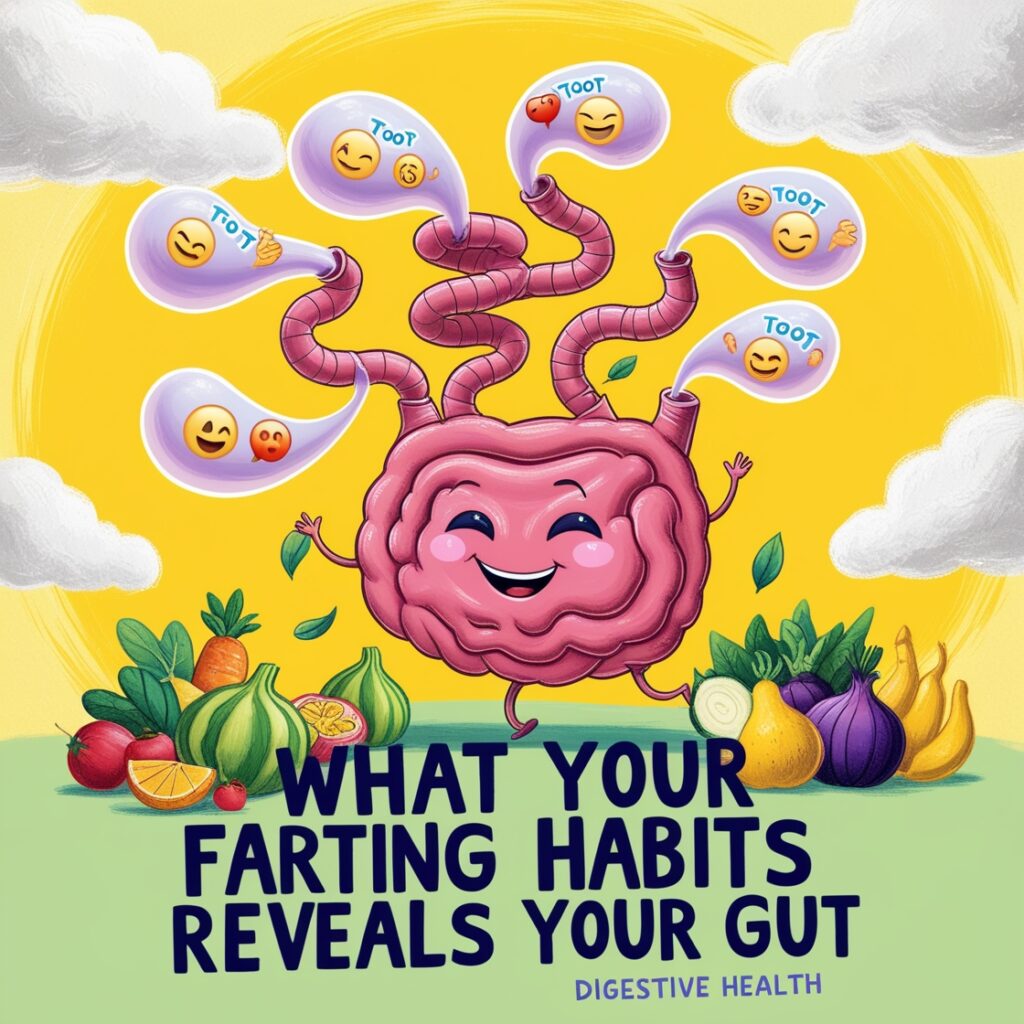Let’s be honest – farting is more than just a source of humor (though it’s definitely that too!). It’s actually a valuable indicator of your digestive health. Believe it or not, your farts can give you important clues about how your body is processing food, your gut bacteria, and whether certain foods might be causing trouble for your digestion.
In this post, we’re going to explore how your farting habits can reveal what’s going on in your gut and how tracking your farts with FartRanker’s Personal Fart Tracker can help you improve your digestive health. Let’s dive into the connection between your farts and your gut!
Why Do We Fart? A Digestive Overview
Before we get into what your farts can tell you, it’s important to understand why we fart in the first place. Flatulence is a completely normal part of digestion, and it’s caused by two main factors:
- Swallowed Air: Every time you eat or drink, you swallow a little air. Some of that air ends up making its way into your intestines, where it eventually needs to be released as a burp or a fart.
- Gut Bacteria Breaking Down Food: When your body digests food, it doesn’t break everything down completely. That’s where the bacteria in your gut come in. These helpful bacteria break down undigested food in your large intestine, producing gas as a byproduct. This gas is then released as a fart.
On average, a healthy person farts 15 to 20 times a day. So, if you find yourself passing gas regularly, don’t worry – it’s a sign that your digestive system is doing its job.
What Your Farting Habits Reveal About Your Digestive Health
While farting is normal, certain farting patterns can indicate underlying digestive issues or provide clues about your overall gut health. Here are a few things to pay attention to:
1. Frequency: How Often Are You Farting?
Farting more than 20-30 times a day might be a sign that something in your diet is causing excess gas production. This could be due to high-fiber foods, such as beans or broccoli, which are harder to digest and produce more gas during fermentation.
However, if you notice a sudden increase in farting along with other symptoms like bloating, discomfort, or diarrhea, it could indicate food sensitivities, such as lactose intolerance or gluten sensitivity. Your body might be struggling to break down certain foods, leading to increased gas.
How to track it: Log your fart frequency with the Personal Fart Tracker to identify if specific meals or foods lead to more frequent gas, and see if patterns emerge over time.
2. Smell: Are Your Farts Smelling Stronger Than Usual?
Smelly farts are often caused by sulfur-containing foods, like eggs, meat, and cruciferous vegetables. While these foods are healthy, they can produce more hydrogen sulfide, which leads to that classic “rotten egg” smell.
If your farts are frequently extra smelly and accompanied by digestive discomfort, it could be a sign that your gut is struggling to process certain proteins or that you have an imbalance in your gut bacteria. Foods that are high in sulfur can make these odors even worse.
How to track it: In the Personal Fart Tracker, rate the smell of your farts on a scale from “barely noticeable” to “clear the room.” By doing this, you can connect changes in smell to specific foods or digestive issues.
3. Volume: Are Your Farts Loud or Quiet?
The volume of your farts can tell you whether they’re caused by swallowed air or by fermentation in your gut. Loud farts are typically the result of air that gets swallowed while eating or drinking too fast, especially if you’re consuming carbonated beverages like soda or beer.
Silent farts, on the other hand, are more likely to come from fermentation of undigested food in your intestines. This process produces gases like methane and hydrogen sulfide, which can make the fart silent but deadly (hello, SBDs!).
How to track it: Log the volume of your farts (loud vs. quiet) in the Fart Tracker, and note what you ate or drank before each fart. Over time, you’ll notice whether certain habits lead to louder or quieter farts.
4. Timing: When Do You Fart the Most?
If you find that you’re farting more at certain times of the day, it could give you clues about how your body processes food. For example, many people experience an increase in gas after meals, especially if they eat foods that are harder to digest, like beans, cabbage, or dairy.
Morning farts are also common because your digestive system has been working overnight, breaking down everything you ate the previous day. If you consistently fart at certain times, it could be a sign that certain foods or eating habits are affecting your gut.
How to track it: Log the time of day when you fart the most in the Personal Fart Tracker to see if you notice patterns, like post-meal gas or morning farts. This can help you pinpoint specific triggers.
Common Digestive Issues Linked to Farting
Farting can sometimes point to more specific digestive issues. Here are a few conditions that are commonly linked to changes in farting patterns:
1. Lactose Intolerance
If you’re lactose intolerant, your body can’t properly digest lactose, the sugar found in dairy products. This can lead to gas, bloating, and diarrhea after consuming milk, cheese, or ice cream. If you notice that your farts smell worse or occur more frequently after eating dairy, you might be lactose intolerant.
2. Irritable Bowel Syndrome (IBS)
People with IBS often experience bloating, gas, abdominal pain, and changes in bowel movements. Farting can be more frequent or more uncomfortable for those with IBS, especially after eating foods that are high in fat or fiber. Tracking your farts can help you identify food triggers that might be worsening your symptoms.
3. Gluten Sensitivity or Celiac Disease
If your body struggles to process gluten (found in wheat, barley, and rye), you may experience increased gas, bloating, and digestive discomfort after eating foods like bread, pasta, or baked goods. This can be a sign of gluten sensitivity or celiac disease.
4. Small Intestinal Bacterial Overgrowth (SIBO)
An overgrowth of bacteria in the small intestine can cause excessive gas, especially after eating foods that are rich in carbohydrates. If your gas is paired with bloating, diarrhea, or malnutrition, SIBO might be the culprit.
How to Improve Your Digestive Health by Tracking Farts
By paying attention to your farting habits and tracking them over time, you can take proactive steps toward better digestive health. Here’s how:
1. Identify Food Triggers
Use the Personal Fart Tracker to log your farts and see which foods cause the most gas. This can help you identify foods that your body struggles to digest, so you can reduce or eliminate them from your diet.
2. Make Dietary Adjustments
If you notice certain foods are causing more gas or discomfort, you can adjust your diet to include more gut-friendly options, like low-sulfur vegetables, lean proteins, and fiber from sources like fruits and whole grains.
3. Improve Gut Health
You can also use your farting patterns to monitor the health of your gut microbiome. If you’re farting more often than usual, it could be a sign that your gut bacteria are out of balance. Eating more probiotic-rich foods (like yogurt, kefir, or sauerkraut) or taking a probiotic supplement can help restore a healthy balance of bacteria in your gut.
4. Reduce Bloating and Discomfort
Tracking your farts can also help you reduce bloating and discomfort by giving you insights into how your body responds to certain foods. By making small changes to your diet or eating habits, you can feel better and avoid the discomfort that comes from excessive gas buildup.
Track Your Farts for a Healthier Gut
Want to start tracking your farts and learn more about what your digestive system is trying to tell you? FartRanker’s Personal Fart Tracker makes it easy to log your farts, analyze your patterns, and gain insights into your gut health. Whether you’re curious about which foods are causing gas or you’re dealing with digestive discomfort, tracking your farts is the first step toward a healthier gut.
Click here to start using the Personal Fart Tracker and take control of your digestive health!
Conclusion:
Farting is a normal part of digestion, but your farting habits can reveal a lot about the health of your gut. By tracking the frequency, smell, and timing of your farts, you can gain valuable insights into how your body processes food and make adjustments to improve your digestive health. So, embrace your farts, track them with FartRanker, and discover what your gut is really trying to tell you



What a gassy topic to dive into! It’s amazing how much our little toots can tell us about our digestive health. Who knew that flatulence could be a window into our intestines? If only breathing in could do the same for our thoughts! 🤔
So, let’s break it down: our farts are basically the symphony of our gut’s inner workings. A harmonious blend of bacteria working hard (like tiny musicians at a concert) to break down what we consume. And just like any great concert, sometimes there’s a little bit of discordant noise. Don’t worry; those unexpected and loud notes are part of the show! But if your digestive orchestra is playing a bit too out of tune or if the smell could clear a room faster than a fire alarm, it might be a sign to check in with your diet.
Foods like beans, broccoli, and carbonated drinks can really amp up the volume on that symphony. So next time you enjoy a delicious hummus platter, just remember: you might be inviting a wind concerto later on! 🌬️🎶
And let’s not forget about the importance of fiber! It’s like the conductor of your digestive orchestra, helping to keep everything running smoothly—or at least in perfect rhythm. Just be cautious with your intake; if you suddenly double your fiber, your tummy might just blow up like a big ol’ balloon at a parade! 🎈
In all seriousness, keeping an eye on your farting habits can indeed be informative. They can reveal the status of your gut health, so don’t ignore the signs—outhouses and fancy air fresheners were invented for a reason! Keep the conversation about digestive health going, and remember: everyone farts; it’s just a matter of how loud and proud you’re willing to be about it! 😂